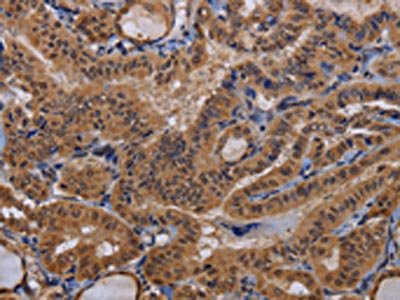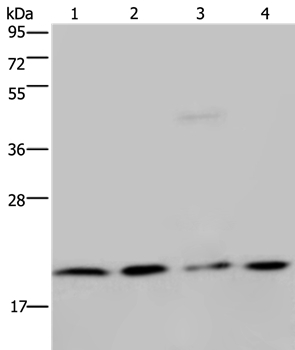![IHC-P analysis of human pancreas tissue using GTX50967 MCTS1 antibody [2G2]. Antigen retrieval : Heat-induced epitope retrieval by 10mM citrate buffer, pH6.0, 120oC for 3min. IHC-P analysis of human pancreas tissue using GTX50967 MCTS1 antibody [2G2]. Antigen retrieval : Heat-induced epitope retrieval by 10mM citrate buffer, pH6.0, 120oC for 3min.](https://www.genetex.com/upload/website/prouct_img/normal/GTX50967/GTX50967_1315_IHC-P_w_23060900_416.webp)
IHC-P analysis of human pancreas tissue using GTX50967 MCTS1 antibody [2G2]. Antigen retrieval : Heat-induced epitope retrieval by 10mM citrate buffer, pH6.0, 120oC for 3min.
MCTS1 antibody [2G2]
GTX50967
ApplicationsImmunoFluorescence, Western Blot, ImmunoCytoChemistry, ImmunoHistoChemistry, ImmunoHistoChemistry Paraffin
Product group Antibodies
ReactivityHuman
TargetMCTS1
Overview
- SupplierGeneTex
- Product NameMCTS1 antibody [2G2]
- Delivery Days Customer9
- Application Supplier NoteWB: 1:1000. IHC-P: 1:150. *Optimal dilutions/concentrations should be determined by the researcher.Not tested in other applications.
- ApplicationsImmunoFluorescence, Western Blot, ImmunoCytoChemistry, ImmunoHistoChemistry, ImmunoHistoChemistry Paraffin
- CertificationResearch Use Only
- ClonalityMonoclonal
- Clone ID2G2
- Concentration0.87 mg/ml
- ConjugateUnconjugated
- Gene ID28985
- Target nameMCTS1
- Target descriptionMCTS1 re-initiation and release factor
- Target synonymsIMD118, MCT-1, MCT1, malignant T-cell-amplified sequence 1, malignant T-cell amplified sequence 1, multiple copies T-cell malignancies, multiple copies in T-cell lymphoma-1
- HostMouse
- IsotypeIgG2a
- Protein IDQ9ULC4
- Protein NameMalignant T-cell-amplified sequence 1
- ReactivityHuman
- Storage Instruction-20°C or -80°C,2°C to 8°C
- UNSPSC41116161
References
- Proliferation-associated 2G4 P48 is stabilized by malignant T-cell amplified sequence 1 and promotes the proliferation of head and neck squamous cell carcinoma.Read this paper
- MCT-1 expression and PTEN deficiency synergistically promote neoplastic multinucleation through the Src/p190B signaling activation. Wu MH et al., 2014 Oct 23, OncogeneRead this paper

![IHC-P analysis of human colon tissue using GTX50967 MCTS1 antibody [2G2]. Antigen retrieval : Heat-induced epitope retrieval by 10mM citrate buffer, pH6.0, 120oC for 3min. IHC-P analysis of human colon tissue using GTX50967 MCTS1 antibody [2G2]. Antigen retrieval : Heat-induced epitope retrieval by 10mM citrate buffer, pH6.0, 120oC for 3min.](https://www.genetex.com/upload/website/prouct_img/normal/GTX50967/GTX50967_1314_IHC-P_w_23060900_718.webp)
![WB analysis of E. coli lysate (Left lane) or E. coli lysate containing recombinant protein fragment for human MCTS1 (NP_054779) gene (amino acids 1-181) (Right lane) using GTX50967 MCTS1 antibody [2G2]. Loading : 5 ug per lane WB analysis of E. coli lysate (Left lane) or E. coli lysate containing recombinant protein fragment for human MCTS1 (NP_054779) gene (amino acids 1-181) (Right lane) using GTX50967 MCTS1 antibody [2G2]. Loading : 5 ug per lane](https://www.genetex.com/upload/website/prouct_img/normal/GTX50967/GTX50967_3605_WB_w_23060900_191.webp)
![IHC-P analysis of human endometrium adenocarcinoma tissue using GTX50967 MCTS1 antibody [2G2]. Antigen retrieval : Heat-induced epitope retrieval by 10mM citrate buffer, pH6.0, 120oC for 3min. IHC-P analysis of human endometrium adenocarcinoma tissue using GTX50967 MCTS1 antibody [2G2]. Antigen retrieval : Heat-induced epitope retrieval by 10mM citrate buffer, pH6.0, 120oC for 3min.](https://www.genetex.com/upload/website/prouct_img/normal/GTX50967/GTX50967_1313_IHC-P_w_23060900_894.webp)
![IHC-P analysis of human tonsil tissue using GTX50967 MCTS1 antibody [2G2]. Antigen retrieval : Heat-induced epitope retrieval by 10mM citrate buffer, pH6.0, 120oC for 3min. IHC-P analysis of human tonsil tissue using GTX50967 MCTS1 antibody [2G2]. Antigen retrieval : Heat-induced epitope retrieval by 10mM citrate buffer, pH6.0, 120oC for 3min.](https://www.genetex.com/upload/website/prouct_img/normal/GTX50967/GTX50967_1316_IHC-P_w_23060900_744.webp)




![MCTS1 antibody [N1C3] detects MCTS1 protein at cytoplasm in rat spleen by immunohistochemical analysis. Sample: Paraffin-embedded rat spleen. MCTS1 antibody [N1C3] (GTX117793) diluted at 1:500.
Antigen Retrieval: Citrate buffer, pH 6.0, 15 min](https://www.genetex.com/upload/website/prouct_img/normal/GTX117793/GTX117793_40289_20150814_IHC_R_w_23060519_825.webp)